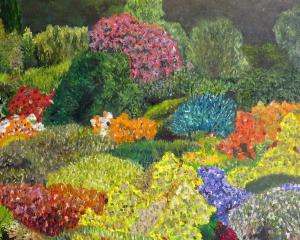Decorative and Fine Arts Societies (DFAS) foster appreciation for a wide range of the arts, including ceramics, photography, architecture and design.
So, given Dunedin's strong arts culture and historical background, it is surprising it does not have its own society.
Dunedin woman Adrienne Salmond hopes to rectify this and has started a steering committee with the aim of establishing an Otago DFAS.
In the United Kingdom the societies run programmes of monthly arts lectures, study days and gallery visits.
Members also have the opportunity to join a broad range of hands-on preservation and conservation projects.
The first New Zealand lecture was held in Christchurch in 2001 and since then societies have been set up in Auckland, Wellington, Nelson and Waikato, followed by Hawkes Bay in 2012 and Marlborough in 2103.
Mrs Salmond heard about the concept while in Melbourne and thought it had merit, so when she got home rang Canterbury's society to find out more about them.
''They were very enthusiastic about it and could not understand how Dunedin did not have one, given it's such a gem of a city with so much culture and historical interest.''
She ended up driving the start-up of a Dunedin society with the help of a steering committee.
They have organised the first lecture from UK specialist in architecture and design of the 20th century Anthea Streeter.
She will speak about British designer Thomas Heatherwick, who is considered to be at the ''cutting edge'' of 21st-century architecture, sculpture planning and engineering.
It is hoped to gauge public interest in setting up a Dunedin society, and if there was sufficient interest the formal process to set up a society would continue, she said.
The intention was for the society to become incorporated and affiliated to the UK organisation, established in 1968.
''I'm hoping Dunedin people will respond. It is not elitist. It is for anyone with an interest in art, ceramics, antiques, photography, design, clothing, embroidery.''
Mrs Salmond had a rare inside look at how the UK society selects its lecturers while in London visiting family last Christmas.
''I was invited to sit in on their assessment of lecturers. I was very privileged.''
A variety of lecturers was organised each year and if the Otago society went ahead, the line-up for next year would included talks on war photographer Lee Miller by her son Antony Penrose, Gerald Deslandes on David Hockney, Theodora Clark on imperial patronage of Catherine the Great, Martin Heard on fashion and impressionist women, and Keir Davidson on Japanese tea houses.
''These are top-notch lecturers. It is a place of fellowship and to advance the appreciation of the fine and decorative arts.''
Following each lecture there would be an opportunity to meet the speaker and other members.
Those who attended the first lecture would be invited to join the society.
If the Dunedin society went ahead, grew and became more financially stable it would be able to look at taking part in restoration and conservation projects, she said.












